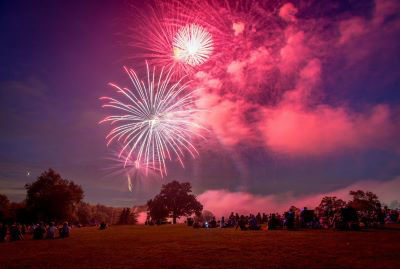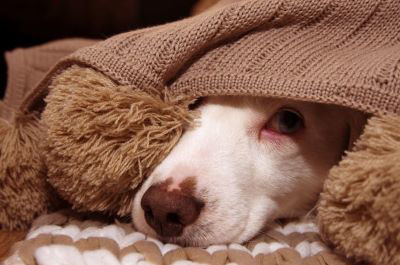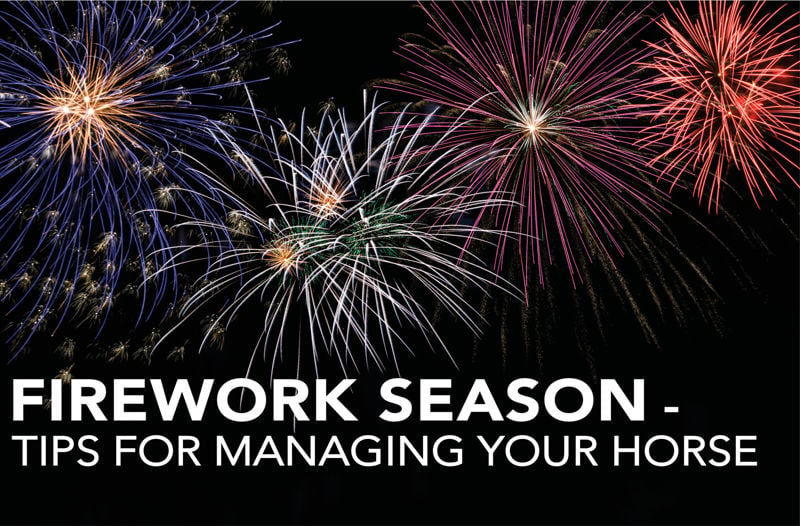Firework celebrations often negatively impact animals and cause stress for owners. They are generally associated with loud bangs, sudden beams of light and burning smells, all of which can cause fear, distress and trigger the flight-or-fight responses in horses, dogs and many other animal species.
Horses are flight animals that have acute hearing and are highly reactive to loud noises and flashing lights. When faced with such situations many horse´s main instinct is to run away with the hope of escaping the unpleasant experience. Dogs, on the other hand, being smaller than horses, will tend to run and hide in an area they consider safe, away from danger.
A distressed animal can be dangerous towards itself, other animals and people around them, therefore, it is our responsibility as owners to keep our animals as calm as possible during these rare but frightening celebrations. As fireworks are now often used as part of Halloween celebrations, not just for Guy Fawkes, it is important to plan how you are going to manage your horses or dogs over a number of weeks, and to make adjustments to their management in the weeks leading up to this challenging period. We can´t take the fireworks out of the celebrations, but we can do our best to keep our animals calm and safe!

Figure 1: Many people enjoy fireworks however, the bright lights, loud bangs and smoke can frighten animals.
HORSES
BEFORE FIREWORK NIGHT:
- Ask neighbours, family and friends about any upcoming events or events planned themselves, as well as monitor local newspapers and social media pages for information.
- If you are participating in fireworks displays, consider the use of silent or low noise fireworks as they still produce the cascading colours but without the startling loud explosions, reducing the anxiety many horses feel.
- Provide a safe environment to prevent injury: check stables for loose nails and sharp edges, and fields for secure fencing and foreign objects.
- Make sure you have up to date third party liability insurance in case there was to be an accident.
- Get horses used to radio noise on the yard, this will help distract horses from firework bangs during events.
- In terms of their feeding schedule bear in mind the possible times firework displays are to take place and plan an appropriate time to feed as this will act as a distraction for them. Also ensure you are feeding a balanced diet to maintain health and comfort and consider a calming supplement for holistic support.
- Make sure you and your team members have an emergency fire plan in place to ensure horses can be brought to safety in case of an emergency.
- If your horse will stay stabled during firework events and this is not their normal routine, gradually change their management a few weeks prior to firework night so the change in environment does not add to their distress and confusion.
ON THE DAY:
- Maintain their normal routine as this will keep them settled and reassured.
- Provide ad-lib hay or haylage to keep them entertained. Be cautious when hanging distractions such as licks or swedes as although they are inviting, they introduce a new hazard if the horse were to panic.
- Turn on the radio and lights to drown out the noise and disguise the sudden flashing from the fireworks.
- If rugged, it is advised to put them in a fleece as it will wick away any sweat caused by distress. If turned out, consider putting a rug underneath their turnout rug to wick off sweat.
- Check on horses regularly as the night goes on and after the firework display.
- Ensure personal safety equipment, such as helmets, boots and gloves, are available for everyone in the yard in case they need to handle excited or stressed horses.
- Consider removing water buckets from the stables during the firework display to reduce the likelihood of them being knocked over. If the buckets were knocked over and the stable flooded it could cause more distress.
- For maximum security, shut any exterior gates in case a horse manages to get escape from its stable or field.
AFTER FIREWORK NIGHT:
- Check over horses in daylight for any injuries or scratches.
- Thoroughly check the fields and the yard for any debris caused by the fireworks.
DOGS
BEFORE FIRE WORKS NIGHT:
- Ask neighbours, family and friends about any upcoming events or events planned themselves, as well as monitor local newspapers and social media.
- Make sure your house is secure and escape-proof: close windows and curtains if inside, and secure fencing if outside.
- If you have your dog indoors during firework events and they are not used to it, change their routine a few weeks prior to the event to give them a chance to settle. Vice versa if they are routinely kept indoors and you would prefer them to be outdoors.
- Create a safe place for them. This could be a little area where they are comfortable with their favourite bed and toy.
- During firework season, walk your dogs during daylight as this will help relax them before it becomes too noisy at night.
- To help disguise the loud banging noise, switch on a TV or radio. Allow them to adapt to this new noise a few weeks prior to firework displays.
- Make sure your dog´s microchip and insurance are up to date in case there were to be any accidents.
- If their safe place is a kennel, partially cover them with a blanket to make them sound-proof.
- Consider introducing a calmeing supplement for a holistic approach a few weeks prior to the celebrations and throughout the events to help them feel relaxed and reduce anxiety.

Figure 3: Dogs will usually find a safe, quite place to hide during fireworks.
ON THE DAY:
- Follow their normal routine as much as possible, feed and exercise them as normal.
- If possible, do not leave them alone during the event, having people around will make them feel secure and reassured.
- Provide entertainment, play games and keep the TV or radio on to drown out noise.
AFTER FIREWORK NIGHT:
- Check for any debris in the garden before letting your dog out as this may harm them
SUMMARY
Fireworks can cause stress and anxiety in horses and dogs, triggering their fight-or-flight response. To keep your animals safe, prepare in advance by checking for local events, securing their environment, maintaining routines, and using calming supplement for additional support. On the day, distract them with forage, music and familiar surroundings to reduce fear. Afterward, inspect the area for debris to ensure safety. With proper planning and managment, you can minimize distress and help your animals stay calm during firework season. For expert equine and canine nutrition advice, contact our team today!
For any advice or questions you may have, please don't hesitate to reach out to our expert nutrition team. You can call 0800 585525 Monday-Friday 8:30am-5:00pm. Email [email protected], or send us a DM on social media.


